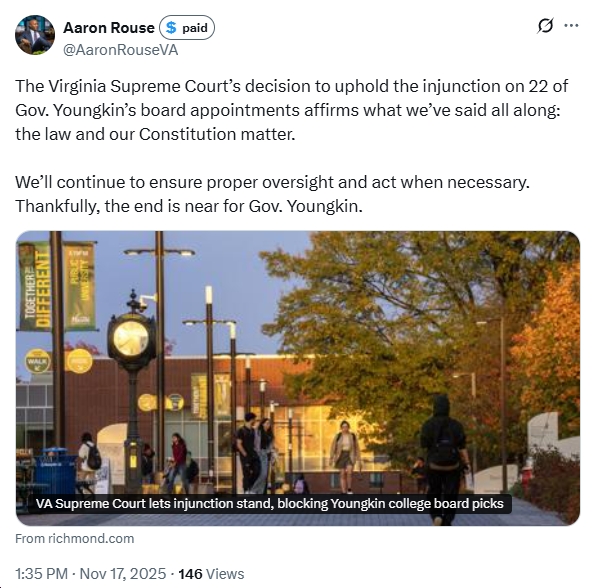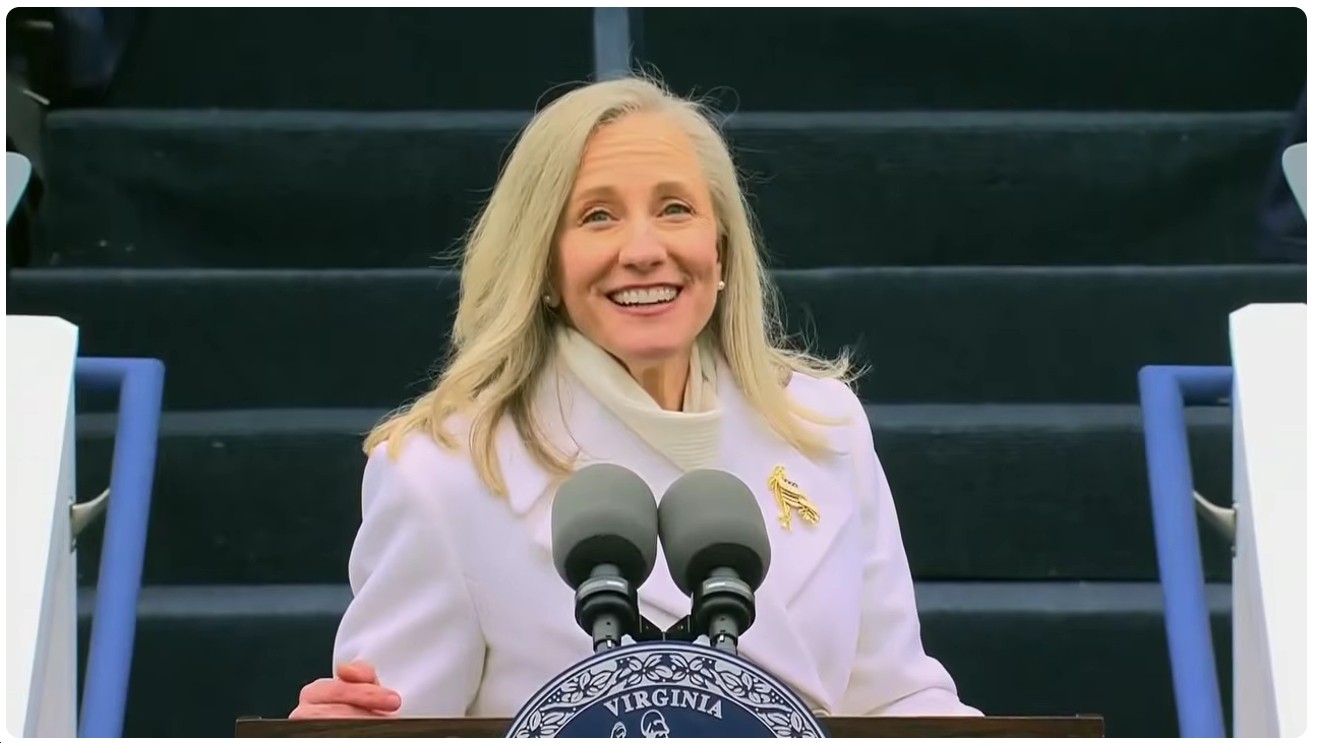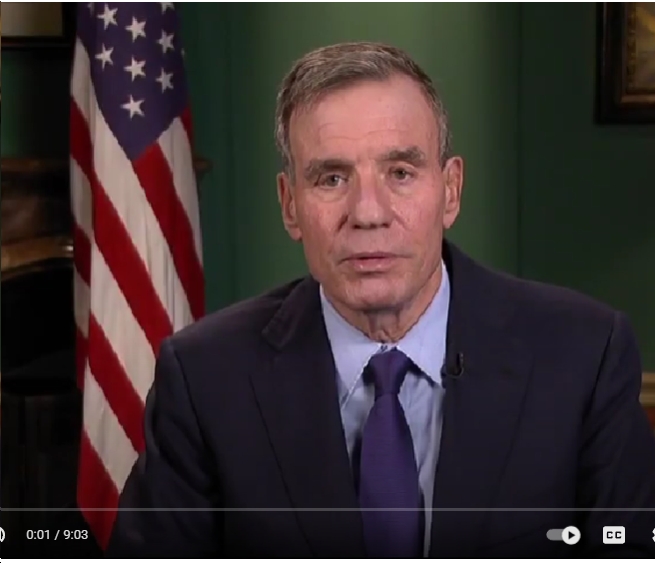by Paul Goldman
Here at 200-proof politics, we analyze the education proposal unveiled yesterday by GOP gubernatorial candidate Ken Cuccinelli as a chess board move, not as a policy wonk. In that regard, we have been writing since last year that education would be the deciding issue in 2013 should either the Dem or GOP candidate “win” the issue. Moreover, I have maintained this posture even longer in several conversations with both McAuliffe and Cuccinelli, along with others running for office at various levels of the game.
Admittedly the polls today show education to be of less concern to voters than at any time in the modern era. There is no reason to doubt the accuracy of the polls on this matter, since they have all been consistent here. Thus I will have to concede the evidence suggests my view of the education issue isn’t shared by the voters, much less the pundits. In most elections in the modern age, education showed up as the top state issue. But not today, by a long shot.
My reaction: A chorus from a Collin Raye song:
Well, that’s my story.
I ain’t got a witness, and I can’t prove it,
but that’s my story and I’m stickin’ to it.
Or, given that this is a column, perhaps Jimmy Buffet sang the better answer:
That’s my story and I’m stickin’ to it
That’s my life and all that I’ve got
Call me a liar, call me a writer
Believe me or not
Believe me or not.
Either way, Buffet or Raye, the bottom line to me is the same: As purely a matter of chess board strategy, this was the first time the Cuccinelli campaign indicated to me they were ready for prime time. Here’s why.
1. This is the first time they seemed to have a coordinated approach in terms of their TV ads, policy release statement and campaign events all around a major strategy play. A savvy Democratic strategy person pointed that out. She has an interesting insight when you noodle on it. To be sure, a “stopped clock” is right twice a day. But what if it was something else?
2. If Bob Lewis’ story in the AP is basically indicative of the reaction – he is a top flight political reporter – it shows that the carefully staged and cleverly written Cuccinelli proposal could “get over” as they say. The Blaine Amendment repeal is iffy for sure, but if my Internet search is right, then North Carolina and Maryland DO NOT have Blaine Amendments. So the whole issue might not be all that important to swing voters here in 2013 given what is on their mind about other things.
3. The preamble to the Cuccinelli plan is something, by and large, I could have written for Wilder’s and Warner’s platforms, or Henry Howell’s for that matter, it is something Tim Kaine would regularly say in a speech, go down the list. GUV candidate George Allen could have said it, probably did. It tells me Cuccinelli’s campaign may be learning the art of political communication in Virginia.
4. The plan was backed up by arguably Cuccinelli’s best TV ad to date, because it didn’t have the same basic problems discussed in this space weeks ago. He spoke to camera, he looked more at ease, he didn’t look anything like his caricature. This was pointed out to me by a savvy Democratic strategy person. She was right, his ad folks finally got it right.
5. THE ACTUAL SUBSTANCE is not really the key to the politics anyway unless, in the future, a particular part of the plan becomes an issue into itself. As I say: read the stories. Those opposed were the usual suspects in the anti-Cuccinelli camp. It is no different when the press trots out the same anti-McAuliffe folks. To the swing voters, it is yada, yada, yada.
6. If you analyze the history of campaigns for Governor, NO REPUBLICAN HAS LOST who “won” the education debate as a matter of politics. Indeed, the reason segregationist Miles Godwin is amazingly respected is his role in jamming through the General Assembly the state sales tax to fund K-12 education improvements in a state nationally known for ranking near the bottom of such support. This has trumped a solid record as a full-blown segregationist until his death. Starting with 1981, education has been a big issue (improving teacher salaries), 1993 (implementing statewide testing), 1997 (proposal to add 4,000 new teachers at state expense), 2001 (community colleges), 2005 (pre-K), and in my view, there really wasn’t much of an education issue in 2009. All the guys who were seen as winning the education issue – Robb, Allen, Gilmore, Warner and Kaine – won. It has proven to be the best issue in most campaigns.
In that regard, let me therefore close by saying – as I have written repeatedly on this blog – that the 2013 McDonnell Transportation plan opened the door for Republicans running for statewide office to “win” the education issue. Indeed, the Democrats admitted this was true when initially opposing McDonnell’s proposal, only to back the modified version even though it took $2 billion from education and gave it to road developers as DEMOCRATS HAVE ALWAYS MAINTAINED IN EVERY OTHER GUV RACE. Indeed, this was the reason Democrats initially opposed McDonnell’s plan!
Again, I am not judging the merits of the 2013 transportation plan: only the politics. I am not judging the $2-#3 billion claim as to the merits, only pointing out this what Democrats said.
The point being: the litany of winning GUV campaigns on education above shows that having a new idea, at least in terms of a marque issue in a GUV race, tends to be the political strategy way to become the “education governor” for purposes of the campaign.
My bottom line: As a political play, Cuccinelli missed a chance for a big win on education, as has McAuliffe in my view, by not embracing the next Big Bipartisan Idea: The Warner-Kaine-Webb-Cantor-McDonnell tax credit proposal that would create 50,000 jobs in Virginia, saves localities billions in construction costs, and is based on private capital. It also reduces the federal government’s reliance on debt!
There are many hundreds and hundreds of aging, obsolete schools that would qualify for a total modernization under the Warner-Kaine-Webb-Cantor-McDonnell plan, from the poorest rural counties to actually the older, poorer areas of Fairfax and all the suburban enclaves and central cities also. The NEA on the left has finally decided to back, so have conservative publications and groups on the right.
They published a joint piece in Politico on the issue, Kaine wrote a piece about his experiences with the issue for Style Weekly in Richmond. It is a NO BRAINER politically.
Thus Cuccinelli’s education plan shows the campaign has a pulse, but there is still minimal brain activity. Still, the bottom line: If Cuccinelli’s play yesterday indicates he is going to try and “win” the education issue, that should worry Democrats. I believe education is a sleeper issue this year. Terry’s got some solid education stuff in his platform.
If there is going to be a positive discussion on anything this year, education might be it. I have no idea where Cuccinelli is going with his education play. He may go nowhere. But there is enough in his plan and rollout to suggest education might play a bigger role for him in the Fall than it has during the Winter, Spring and Summer.


![Virginia NAACP: “This latest witch hunt [by the Trump administration] against [GMU] President Washington is a blatant attempt to intimidate those who champion diversity.”](https://bluevirginia.us/wp-content/uploads/2025/07/gmuwwashington.jpg)















